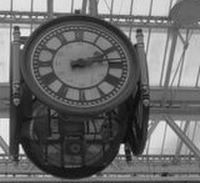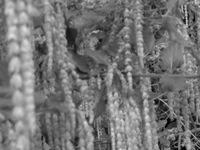this too
Friday, April 29, 2005
Wednesday, April 27, 2005
Somewhere else
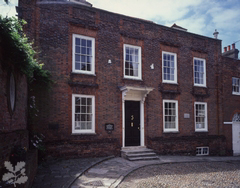
I’m reading The Master by Colm Toíbín, his novel, or fictionalised biography, about Henry James. A fine and unusual book, whose quiet majesty has slowly dawned on me as I read. I’ve been reading it on the bus, going to and from work – the only good thing about a bus journey of more than an hour – and was near the end this morning when the bus crossed the river, the next stop was mine, and I wished it wasn’t.
So, not really having the time, but unable to resist, I took the book when I went for lunch in the student canteen. Buried myself in it at once as I absently forked up my chile con carne – not good for the digestion, or for the front of my sweater.
It doesn’t dominate the book, but Toíbín, who’s gay, weaves a thread of gentle speculation about James’s sexuality and opts for the version where he was attracted to men, but led a life entirely of the mind. I arrive, over the chile con carne, in a cavernous room crowded with noisy young people, at this passage:
[1899. James, aged 56, is with Henrik Andersen, the young sculptor he’s befriended, in the study at his house in Rye, where he’s recently moved and will live for the rest of his life – the house, which I have visited, has been evoked with strong physical detail]
‘This is where all your work is done,’ Andersen said when Henry had closed the door behind them.
‘This is where the tales are told’, Henry said.
To the left of the entrance there was a wall of books, and when Andersen had studied the view and marvelled at the light, he walked over to inspect the books, not appearing to realise at first that all of them bore his host’s name. He took down one or two and then gradually it seemed to dawn on him that this large high bookcase contained the novels and stories of Henry James in all their editions from both sides of the Atlantic. He became agitated and excited as he took volumes down and looked at the spines and the title pages.
‘You have written a whole library’, he said. ‘I will have to read them all’.
He turned to look at Henry.
‘Did you always know that you would write all these books?’
‘I know the next sentence,’ Henry said, ‘and often the next story and I take notes for novels.’
‘But did you once plan it all? Did you not say this is what I will do with my life?’
By the time he asked the second question, Henry had turned away from him and was facing towards the window with no idea why his eyes had filled with tears.

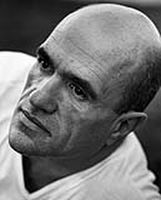
Finding my plate empty, I get up reluctantly to take my tray to the racks from where plates and cutlery are cleared away; stand there, book in one hand, tray in the other. The tray won’t fit into the rack; it’s too narrow. I keep trying, then apologetically thrust it at the young man who’s just come to start clearing. ‘I seem to have an extra-small tray’. Odd look. ‘It’s the wrong way round’. Yes, I’m holding it the wrong way round. I’ve been eating here for three years. But I’m not here, I’m in Rye in 1899.
I wrote a while ago about no longer finding fiction enough, being keener on presence in the real world, less keen to disappear into imagination. Well, thankfully, there’s an exception to almost everything.

I’m reading The Master by Colm Toíbín, his novel, or fictionalised biography, about Henry James. A fine and unusual book, whose quiet majesty has slowly dawned on me as I read. I’ve been reading it on the bus, going to and from work – the only good thing about a bus journey of more than an hour – and was near the end this morning when the bus crossed the river, the next stop was mine, and I wished it wasn’t.
So, not really having the time, but unable to resist, I took the book when I went for lunch in the student canteen. Buried myself in it at once as I absently forked up my chile con carne – not good for the digestion, or for the front of my sweater.
It doesn’t dominate the book, but Toíbín, who’s gay, weaves a thread of gentle speculation about James’s sexuality and opts for the version where he was attracted to men, but led a life entirely of the mind. I arrive, over the chile con carne, in a cavernous room crowded with noisy young people, at this passage:
[1899. James, aged 56, is with Henrik Andersen, the young sculptor he’s befriended, in the study at his house in Rye, where he’s recently moved and will live for the rest of his life – the house, which I have visited, has been evoked with strong physical detail]
‘This is where all your work is done,’ Andersen said when Henry had closed the door behind them.
‘This is where the tales are told’, Henry said.
To the left of the entrance there was a wall of books, and when Andersen had studied the view and marvelled at the light, he walked over to inspect the books, not appearing to realise at first that all of them bore his host’s name. He took down one or two and then gradually it seemed to dawn on him that this large high bookcase contained the novels and stories of Henry James in all their editions from both sides of the Atlantic. He became agitated and excited as he took volumes down and looked at the spines and the title pages.
‘You have written a whole library’, he said. ‘I will have to read them all’.
He turned to look at Henry.
‘Did you always know that you would write all these books?’
‘I know the next sentence,’ Henry said, ‘and often the next story and I take notes for novels.’
‘But did you once plan it all? Did you not say this is what I will do with my life?’
By the time he asked the second question, Henry had turned away from him and was facing towards the window with no idea why his eyes had filled with tears.


Finding my plate empty, I get up reluctantly to take my tray to the racks from where plates and cutlery are cleared away; stand there, book in one hand, tray in the other. The tray won’t fit into the rack; it’s too narrow. I keep trying, then apologetically thrust it at the young man who’s just come to start clearing. ‘I seem to have an extra-small tray’. Odd look. ‘It’s the wrong way round’. Yes, I’m holding it the wrong way round. I’ve been eating here for three years. But I’m not here, I’m in Rye in 1899.
I wrote a while ago about no longer finding fiction enough, being keener on presence in the real world, less keen to disappear into imagination. Well, thankfully, there’s an exception to almost everything.
Tuesday, April 26, 2005
Information age?
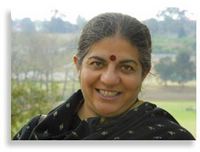
Vandana Shiva
The Indian environmentalist Vandana Shiva has a great article in the new issue of Resurgence magazine (sadly, they don't have this article on line - I hope that's because it's also being published elsewhere ) on the lessons of the December 2004 tsunami.
Whilst all her points are devastatingly obvious and devastatingly absent from most of the media, one seems particularly relevant to quote here in my tiny spot on the information superhighway:
The tsunami teaches us that a world organised around markets and profits, forgetting nature and people, is ill-equiped to deal with such disasters. In spite of us living in an ‘information age’ and in ‘knowledge economies’, the knowledge of the 8.9 Richter-scale earthquake could not be communicated by the US geological survey to the countries of the Indian Ocean in time to take action to save lives. While the stock-markets of the world react instantaneously to signals, while the entire out-sourcing economy of the information technologies is based on instantaneous communication, it took the world days to count how many died, how many have become homeless. Each day the number rose, beginning with 20,000, until it reached over 280,000. The tsunami tells us we do not live in an information age based on ‘connectivity’: we live in an age of ignorance, exclusion and disconnection.
Something for all of us who like to believe we have high progressive ideals and who revel in this technology to think hard about.

Vandana Shiva
The Indian environmentalist Vandana Shiva has a great article in the new issue of Resurgence magazine (sadly, they don't have this article on line - I hope that's because it's also being published elsewhere ) on the lessons of the December 2004 tsunami.
Whilst all her points are devastatingly obvious and devastatingly absent from most of the media, one seems particularly relevant to quote here in my tiny spot on the information superhighway:
The tsunami teaches us that a world organised around markets and profits, forgetting nature and people, is ill-equiped to deal with such disasters. In spite of us living in an ‘information age’ and in ‘knowledge economies’, the knowledge of the 8.9 Richter-scale earthquake could not be communicated by the US geological survey to the countries of the Indian Ocean in time to take action to save lives. While the stock-markets of the world react instantaneously to signals, while the entire out-sourcing economy of the information technologies is based on instantaneous communication, it took the world days to count how many died, how many have become homeless. Each day the number rose, beginning with 20,000, until it reached over 280,000. The tsunami tells us we do not live in an information age based on ‘connectivity’: we live in an age of ignorance, exclusion and disconnection.
Something for all of us who like to believe we have high progressive ideals and who revel in this technology to think hard about.
Monday, April 25, 2005
A joyful watching

John Berger by Jean Mohr
I had a lousy weekend, ending in a joyful evening. Not quite worth the lousy for the contrast with the joy, but it certainly cast the joy into particularly poignant relief.
The lousy weekend came after a lousy week – relentlessly increasing workload, piles of work which grew and grew and towered and toppled and slid off my desk (a lot of it comes in shiny plastic folders). I think I was less firmly grounded than usual because of Monday’s news, so I teetered and came close myself to toppling.
The dread determination not to panic, not to be overwhelmed. The hard-learned lessons of years and years in grinding jobs. Don’t dwell on the big picture. Don’t catastrophise. Do NOT embark on a fruitless quest to take control. Prioritise ruthlessly and regularly. In between look only at the next task. Do it. And the next, the next. Oh it took a long, long time for me to learn this. Even now, knowing it and doing it are different things. The struggle not to struggle. It wears me out.
So by Friday night, a tight-strung, bone-aching weariness. Too tired to move. Too tired to sleep. Not much of anything getting done. Waves of tiredness that start in the sacrum, surge up the back and through the head to punch the rear of the eyeballs.
Little sleep for two nights, until at about 6 on Sunday morning I fell into a deep and miserable dream. I’m at a conference, with a man who seems to be both sweetheart and father figure. He leaves me and goes off with a beautiful delegate. Then I realise I’ve lost my bag, with passport, money and – worst of all – my digital camera! I woke at 9 and spent the day in the emotions of the dream: jealousy, vulnerability, self-blame, abandonment…
So I almost didn’t go the National Film Theatre, where I’d booked a ticket for Another Way of Telling – four half-hour episodes of a 15-year-old TV series with John Berger and Jean Mohr. Oh I’m so glad I went. What a wonderful chance to see this multi-layered, widely branching meditation on photography, to see it now when I have just begun to play with a camera.
As the film-maker, John Christie, said in his introductory talk, it’s the kind of television you can’t make now. Slow. No background music. Lots of still photos. Lots of talking to camera. Looking. Audience looking. Narrator looking and describing the look. Photographer describing the choice of shot, the feel of shooting. Two immensely talented old friends who spark each other off, whose words and pictures weave together into something wonderful. I cannot summarise the programmes, can only send you for a glimpse to the book of the same name, on Amazon, where you can 'search inside'.
Always wanted to be a intellectual, I suppose. All my adult life I’ve hung out with intellectuals, fallen in love with them, worked with them. And fuelled my inferiority complex. I crave thought, crave complexity. And complex thought utterly defeats me. Here, for a delicious couple of hours, was complex thought so lucid, so communicative, I could follow, fully hold, fully respond to it.
I slept afterwards too.

John Berger by Jean Mohr
I had a lousy weekend, ending in a joyful evening. Not quite worth the lousy for the contrast with the joy, but it certainly cast the joy into particularly poignant relief.
The lousy weekend came after a lousy week – relentlessly increasing workload, piles of work which grew and grew and towered and toppled and slid off my desk (a lot of it comes in shiny plastic folders). I think I was less firmly grounded than usual because of Monday’s news, so I teetered and came close myself to toppling.
The dread determination not to panic, not to be overwhelmed. The hard-learned lessons of years and years in grinding jobs. Don’t dwell on the big picture. Don’t catastrophise. Do NOT embark on a fruitless quest to take control. Prioritise ruthlessly and regularly. In between look only at the next task. Do it. And the next, the next. Oh it took a long, long time for me to learn this. Even now, knowing it and doing it are different things. The struggle not to struggle. It wears me out.
So by Friday night, a tight-strung, bone-aching weariness. Too tired to move. Too tired to sleep. Not much of anything getting done. Waves of tiredness that start in the sacrum, surge up the back and through the head to punch the rear of the eyeballs.
Little sleep for two nights, until at about 6 on Sunday morning I fell into a deep and miserable dream. I’m at a conference, with a man who seems to be both sweetheart and father figure. He leaves me and goes off with a beautiful delegate. Then I realise I’ve lost my bag, with passport, money and – worst of all – my digital camera! I woke at 9 and spent the day in the emotions of the dream: jealousy, vulnerability, self-blame, abandonment…
So I almost didn’t go the National Film Theatre, where I’d booked a ticket for Another Way of Telling – four half-hour episodes of a 15-year-old TV series with John Berger and Jean Mohr. Oh I’m so glad I went. What a wonderful chance to see this multi-layered, widely branching meditation on photography, to see it now when I have just begun to play with a camera.
As the film-maker, John Christie, said in his introductory talk, it’s the kind of television you can’t make now. Slow. No background music. Lots of still photos. Lots of talking to camera. Looking. Audience looking. Narrator looking and describing the look. Photographer describing the choice of shot, the feel of shooting. Two immensely talented old friends who spark each other off, whose words and pictures weave together into something wonderful. I cannot summarise the programmes, can only send you for a glimpse to the book of the same name, on Amazon, where you can 'search inside'.
Always wanted to be a intellectual, I suppose. All my adult life I’ve hung out with intellectuals, fallen in love with them, worked with them. And fuelled my inferiority complex. I crave thought, crave complexity. And complex thought utterly defeats me. Here, for a delicious couple of hours, was complex thought so lucid, so communicative, I could follow, fully hold, fully respond to it.
I slept afterwards too.
Friday, April 22, 2005
Ooh blue tulips!
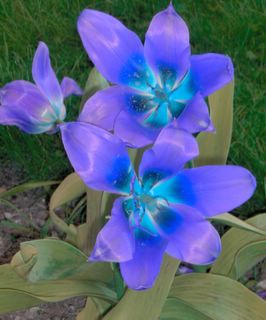
This was my photo of red tulips. There were more. The text was appropriately red-themed: ripe and blood and pomegranates and lolling tongues. But nature has undergone a mysterious technological transformation on the way here. Honestly, I didn't doctor it myself. Blogger has been having problems recently, but I haven't seen this elsewhere. Oh well, blue tulips - enjoy!

This was my photo of red tulips. There were more. The text was appropriately red-themed: ripe and blood and pomegranates and lolling tongues. But nature has undergone a mysterious technological transformation on the way here. Honestly, I didn't doctor it myself. Blogger has been having problems recently, but I haven't seen this elsewhere. Oh well, blue tulips - enjoy!
Thursday, April 21, 2005
Trying to dance
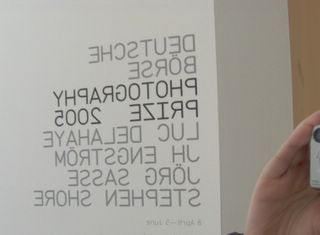
Swedish photographer J H Engström (scroll down in this link) is one of the finalists for this year’s annual prize from the Photographer’s Gallery in London. Gorgeous pictures, I thought. Poetic and painterly, soft but solid, clear but complex, beautiful but not unchallengingly so. I could not ask for more. Well, I could ask for more and better online examples... they only give a hint, do not dance hauntingly and jitteringly towards you as they do in the gallery.

Swedish photographer J H Engström (scroll down in this link) is one of the finalists for this year’s annual prize from the Photographer’s Gallery in London. Gorgeous pictures, I thought. Poetic and painterly, soft but solid, clear but complex, beautiful but not unchallengingly so. I could not ask for more. Well, I could ask for more and better online examples... they only give a hint, do not dance hauntingly and jitteringly towards you as they do in the gallery.
Tuesday, April 19, 2005
Shifting sands

A brief email from his son brought the news yesterday that a colleague, universally liked and admired, has been very ill, in a far-off place where we all thought him basking in success and leisure.
One of those moments. Someone nudged the projector and the picture slips sideways.
Since we all love him, everyone touches what is best in themselves. Quiet cooperation. His work is swiftly divided, taken up by others.
The picture re-forms. Leaving a flood of warmth and concern for R, but a cold sensation in the pit of the stomach. A reminder that the pattern of our lives, work, relationships is not, as we like to think, a Rubik’s Cube, solved, firmly slotted into place. More like a sand mandala.

A brief email from his son brought the news yesterday that a colleague, universally liked and admired, has been very ill, in a far-off place where we all thought him basking in success and leisure.
One of those moments. Someone nudged the projector and the picture slips sideways.
Since we all love him, everyone touches what is best in themselves. Quiet cooperation. His work is swiftly divided, taken up by others.
The picture re-forms. Leaving a flood of warmth and concern for R, but a cold sensation in the pit of the stomach. A reminder that the pattern of our lives, work, relationships is not, as we like to think, a Rubik’s Cube, solved, firmly slotted into place. More like a sand mandala.
Monday, April 18, 2005
Brightly coloured Sunday
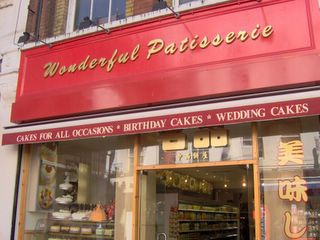
Sunday is quiet, sharp and bright. Eleven o’clock feels early still, with few people out and little traffic, clear sunshine and an outbreak of Spring colours in flowers, café tablecloths and shop windows.
In Chinatown the reddest of dragons and the orangest of oranges adorn the pavements. Somewhere between red and orange, the chili sauce on the white dim-sum dumplings I share with two old friends and colleagues. One is here for a few precious hours between planes, and we’ve come to her favourite place from London days.
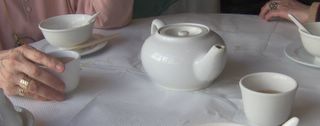
We eat and talk. I’ve known these women so long, know the shapes their lips and hands will take on next. We’re older, softer at the edges and more solid at the centre, than when we used to race busily around the world together. Older, today, feels a good place to be. I’m happy – I think we all are – as we sit at this window table on this brightly coloured morning, with easy laughter exchanging our present lives, our hearts drawn backwards down a long corridor of memories.


Sunday is quiet, sharp and bright. Eleven o’clock feels early still, with few people out and little traffic, clear sunshine and an outbreak of Spring colours in flowers, café tablecloths and shop windows.
In Chinatown the reddest of dragons and the orangest of oranges adorn the pavements. Somewhere between red and orange, the chili sauce on the white dim-sum dumplings I share with two old friends and colleagues. One is here for a few precious hours between planes, and we’ve come to her favourite place from London days.

We eat and talk. I’ve known these women so long, know the shapes their lips and hands will take on next. We’re older, softer at the edges and more solid at the centre, than when we used to race busily around the world together. Older, today, feels a good place to be. I’m happy – I think we all are – as we sit at this window table on this brightly coloured morning, with easy laughter exchanging our present lives, our hearts drawn backwards down a long corridor of memories.

Friday, April 15, 2005
Beguiled

by blossom
and by Dick's election fable, which I gather is not entirely original, but still spot on
by Augustine’s Quiz for Bloggers - new to me, as it predates my Augustine addiction
by Easter in Mexico, as recounted and photographed by Leslee
by Ruth’s far-from-clichéd tales of life in Provence.

by blossom
and by Dick's election fable, which I gather is not entirely original, but still spot on
by Augustine’s Quiz for Bloggers - new to me, as it predates my Augustine addiction
by Easter in Mexico, as recounted and photographed by Leslee
by Ruth’s far-from-clichéd tales of life in Provence.
Thursday, April 14, 2005
Julia

Someone on my blogroll has died. Is there a protocol for this? Even if there was, Julia Darling was a one-off, I think. If I hadn't known her story, that the fullest flowering of her wonderful talent as a writer came in the years after she was diagnosed with cancer, I'd still have savoured her warm, wild, wacky, moving poetry and plays and novels and songs. As it happens I came to know more of her work through reading her blog and hearing her on the radio, talking with astonishing directness and humour about living with illness for which there was no more treatment. I only knew her through her words, but they were so alive. It's very hard to believe she's gone. Her own words, her poems on her website and in her blog today say it best.
Later: here is a piece about Julia, with links to an article she wrote, her recent online poetry workshop, and reviews of one of her novels, from today's online Guardian.
And here you can listen to a tribute from BBC Radio 4 Woman's Hour, and to a recent interview with Julia.

Someone on my blogroll has died. Is there a protocol for this? Even if there was, Julia Darling was a one-off, I think. If I hadn't known her story, that the fullest flowering of her wonderful talent as a writer came in the years after she was diagnosed with cancer, I'd still have savoured her warm, wild, wacky, moving poetry and plays and novels and songs. As it happens I came to know more of her work through reading her blog and hearing her on the radio, talking with astonishing directness and humour about living with illness for which there was no more treatment. I only knew her through her words, but they were so alive. It's very hard to believe she's gone. Her own words, her poems on her website and in her blog today say it best.
Later: here is a piece about Julia, with links to an article she wrote, her recent online poetry workshop, and reviews of one of her novels, from today's online Guardian.
And here you can listen to a tribute from BBC Radio 4 Woman's Hour, and to a recent interview with Julia.
Wednesday, April 13, 2005
Passing by these every day
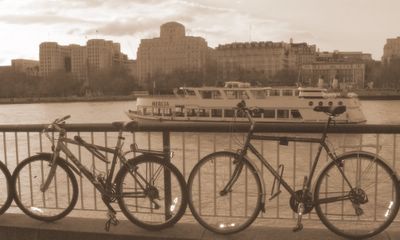
I live South of the River and work just North of it, just across Waterloo Bridge. Most days, morning and evening, I march across the bridge, ignoring or glaring at the view. Glaring at the view because I don’t want to be here viewing it.
Taking photos, it’s hard to keep glaring. Hard to look and look again and frame and move round and look again and stay detached and rejecting. Hard to look and look again and not be here and here. Hard to look for patterns and colours and stories and not see beauty and feel involved.
I thought I’d write more in my blog, feel rather disappointed in myself because so far I can only summon fragments. It’s a surprise to find that what I most enjoy is taking pictures. They take me out of the spinning tumbling words of frustration. Out of no, won’t, leave, can’t, and into stopping, being, looking. Out of grey weariness, blue melancholy, red temper, into grey water, blue sky, red tulips.
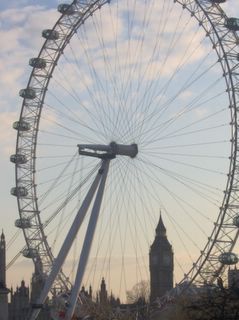
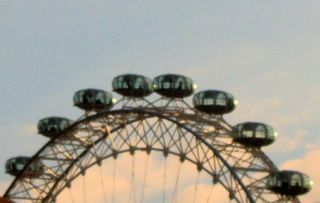
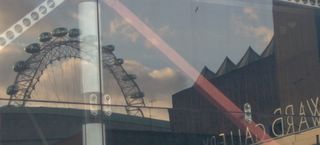
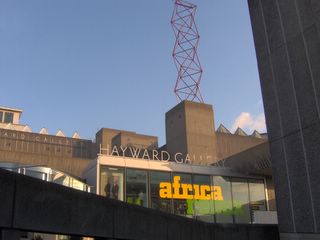

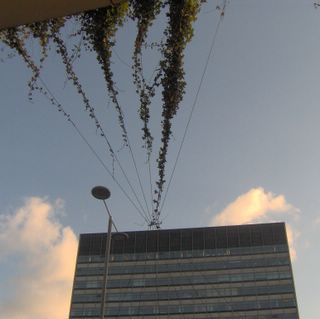
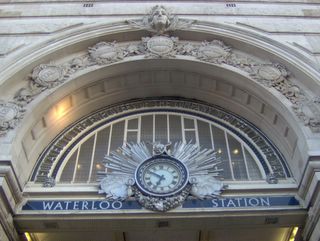

I live South of the River and work just North of it, just across Waterloo Bridge. Most days, morning and evening, I march across the bridge, ignoring or glaring at the view. Glaring at the view because I don’t want to be here viewing it.
Taking photos, it’s hard to keep glaring. Hard to look and look again and frame and move round and look again and stay detached and rejecting. Hard to look and look again and not be here and here. Hard to look for patterns and colours and stories and not see beauty and feel involved.
I thought I’d write more in my blog, feel rather disappointed in myself because so far I can only summon fragments. It’s a surprise to find that what I most enjoy is taking pictures. They take me out of the spinning tumbling words of frustration. Out of no, won’t, leave, can’t, and into stopping, being, looking. Out of grey weariness, blue melancholy, red temper, into grey water, blue sky, red tulips.







Tuesday, April 12, 2005
Local
This was the road between two large farms, a main route south from London. The inn was there before 1800, maybe a long time before. Records from 1805 show a wooden building. The present red-brick pile dates from 1865, around the time the farms were sold off in parcels to developers and the sprawling suburb of Victorian villas, large and small, began to grow where fields of corn and sheep had been.
The inn was a stage for horse-drawn coaches, then a terminus for trams and later buses, the pivotal point of continuity in a landscape undergoing great change.
A few years ago it was bought by a big brewery and became one of their ubiquitous chain. In the face of loud local protests – a rare phenomenon in this quiet patch of commuterland, they changed the more-than-two-hundred-year-old name. All their pubs have the same name, you see. It’s one of those slightly ironic plays on traditional pub names.

Now they've erected this sign.
The inn was a stage for horse-drawn coaches, then a terminus for trams and later buses, the pivotal point of continuity in a landscape undergoing great change.
A few years ago it was bought by a big brewery and became one of their ubiquitous chain. In the face of loud local protests – a rare phenomenon in this quiet patch of commuterland, they changed the more-than-two-hundred-year-old name. All their pubs have the same name, you see. It’s one of those slightly ironic plays on traditional pub names.

Now they've erected this sign.
Monday, April 11, 2005
Yellow, yellow
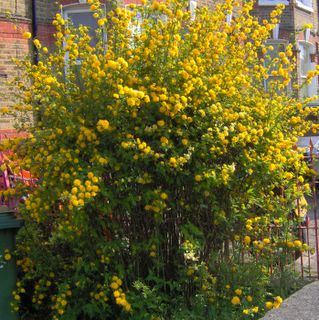

Click for bigger, more yellow
This glass sculpture by Dale Chihuly was displayed at the Kew Gardens orchid festival in March. I liked it for it's brightness and complexity and density and roundness, but it didn't feel right alongside the lush, fragile, pastel orchids. I can't think they were the kind of thing the artist was alluding to. It came back to me, though, when I saw the bright bush, with all those same qualities, flowering in my street.
Jude asks what the bush is. I think it's Kerria japonica 'Pleniflora'.


Click for bigger, more yellow
This glass sculpture by Dale Chihuly was displayed at the Kew Gardens orchid festival in March. I liked it for it's brightness and complexity and density and roundness, but it didn't feel right alongside the lush, fragile, pastel orchids. I can't think they were the kind of thing the artist was alluding to. It came back to me, though, when I saw the bright bush, with all those same qualities, flowering in my street.
Jude asks what the bush is. I think it's Kerria japonica 'Pleniflora'.
Saturday, April 09, 2005
Cold evening, monkey mind
It's marrow-chillingly cold, though the sun was out earlier and the evening light is soft.
I’m reading a novel by a writer new to me, Andrew Greig. In Another Light. About memory, and near-death, and the feeling of life afterwards. It’s set partly in the Orkneys. A great sense of empty beauty and small community.
It makes me long for a sense of place, to be in the country, not just bits of park and woodland on the edge of the city.
Need what I felt at M’s house in France. The grass and trees pressing into my body, green air in my lungs. Waking with a smile on my face.
On the last evening, walking downhill out of the forest, I saw a deer race out of the trees and across a field. Over so quickly, just a shadow on my retina.
I cried all the way home on the train. Absurd. I never told M. Kept shutting myself in the toilet and trying to stop. Back in my seat, weeping again.
What is it about French trains? The train from Valence, leaving J on the platform, knowing for certain I would never go back because I loved his wife and kids almost as much as I loved him.
However did I get here in five minutes while the kettle boiled?
I’m reading a novel by a writer new to me, Andrew Greig. In Another Light. About memory, and near-death, and the feeling of life afterwards. It’s set partly in the Orkneys. A great sense of empty beauty and small community.
It makes me long for a sense of place, to be in the country, not just bits of park and woodland on the edge of the city.
Need what I felt at M’s house in France. The grass and trees pressing into my body, green air in my lungs. Waking with a smile on my face.
On the last evening, walking downhill out of the forest, I saw a deer race out of the trees and across a field. Over so quickly, just a shadow on my retina.
I cried all the way home on the train. Absurd. I never told M. Kept shutting myself in the toilet and trying to stop. Back in my seat, weeping again.
What is it about French trains? The train from Valence, leaving J on the platform, knowing for certain I would never go back because I loved his wife and kids almost as much as I loved him.
However did I get here in five minutes while the kettle boiled?
Surprisingly nice poem
Sighs all round as the Poet Laureate, Andrew Motion, pops up with his lines on the Royal Wedding. But actually they are very touching, especially the last verse:
The heart which slips and sidles like a stream
Weighed down by winter-wreckage near its source -
But given time, and come the clearing rain,
Breaks loose to revel in its proper course.
The heart which slips and sidles like a stream
Weighed down by winter-wreckage near its source -
But given time, and come the clearing rain,
Breaks loose to revel in its proper course.
Friday, April 08, 2005
Jason(s)

Jason (I’ll call him that) works in the newsagents, worked there when I moved here 17 years ago. He’s efficient at the job, but there’s something slightly off key, over-deliberate. Perhaps he has mild learning difficulties. He always looks the same, slightly alarmingly eternally youthful, very very thin, in jeans and baggy sweaters.
When I first went there, the shop was run by two old women, and Jason. A few years later they retired and sold or leased to two business-like youngish men from Sri Lanka. Jason remained. His relationship with the other men is one of pained politeness, thinly veiled hostility on both sides. I’ve always wondered what the story was. Did Jason ‘come with the shop’? Was keeping him on part of the lease? Perhaps, even, he became the owner and the others manage it for him.
The other day I met him in the street, just around the corner from the newsagents. I said Hello Jason and he said Hello. I continued to the shop. And there, behind the counter… was Jason.
I’m shortsighted and don’t always wear my glasses. I probably said hello to some surprised guy who wasn’t Jason.
But just possibly he’s been twins all these years. I’m being vigilant, intent on spotting any ‘continuity’ issues. But I’m very bad at noticing when someone looks different, shaves off his beard or moustache for example. I tend to see the person in my mind’s eye. One day he’ll surely have a spot on his face, or a bandage on his hand, or something… and I’ll be dropping in extra often to check whether he always has it.

Jason (I’ll call him that) works in the newsagents, worked there when I moved here 17 years ago. He’s efficient at the job, but there’s something slightly off key, over-deliberate. Perhaps he has mild learning difficulties. He always looks the same, slightly alarmingly eternally youthful, very very thin, in jeans and baggy sweaters.
When I first went there, the shop was run by two old women, and Jason. A few years later they retired and sold or leased to two business-like youngish men from Sri Lanka. Jason remained. His relationship with the other men is one of pained politeness, thinly veiled hostility on both sides. I’ve always wondered what the story was. Did Jason ‘come with the shop’? Was keeping him on part of the lease? Perhaps, even, he became the owner and the others manage it for him.
The other day I met him in the street, just around the corner from the newsagents. I said Hello Jason and he said Hello. I continued to the shop. And there, behind the counter… was Jason.
I’m shortsighted and don’t always wear my glasses. I probably said hello to some surprised guy who wasn’t Jason.
But just possibly he’s been twins all these years. I’m being vigilant, intent on spotting any ‘continuity’ issues. But I’m very bad at noticing when someone looks different, shaves off his beard or moustache for example. I tend to see the person in my mind’s eye. One day he’ll surely have a spot on his face, or a bandage on his hand, or something… and I’ll be dropping in extra often to check whether he always has it.
Thursday, April 07, 2005
Baa humbug!
Thinking about politics. My goodness, that’s a rare occurrence, but difficult not to with the May general election just confirmed. I’m in the great mass of disaffected former Labour supporters, and I flounder there and mostly just don’t think about it, focus on the specific and the local, things I can be clear about.
A not uncommon position – a little uncommon perhaps in that, for more than 20 years, I worked in politics, thought about little else and suffered from that well-known illusion: if I miss a single news bulletin, fail to keep track of what’s happening everywhere – something dreadful will happen! The first time I went on a meditation retreat, saw and heard no news for several days, gosh it was a big deal.
Now I don’t read or listen to the news religiously, go straight to the Review section of the Sunday papers, no longer know who’s the minister for everything and who’s in government everywhere. And it is weird. What was I doing all those years? I just don’t think about it. But I’m going to have to think about who to vote for in May. Since Labour took power and proved not to have priorities I shared, I’ve voted for Greens, Liberal Democrats and assorted alternative leftists. Ad hoc, tactical decisions every time.
Of course, you don’t lose the urge to belong. I suppose I have diverted this, to some extent, to Buddhism, and that knowledge has made me really wary of identifying too closely with any particular strand. Enough isms for one lifetime. (though most Buddhists take a very thoughtful and questioning approach to this, have a lot to say about the difference between community and over-identification).
But, like most people, I’m a sheep, not a shepherd. The fate of sheep who wonder off alone is not usually a happy one. So I'm still here, the quizzical sheep in the corner.

A not uncommon position – a little uncommon perhaps in that, for more than 20 years, I worked in politics, thought about little else and suffered from that well-known illusion: if I miss a single news bulletin, fail to keep track of what’s happening everywhere – something dreadful will happen! The first time I went on a meditation retreat, saw and heard no news for several days, gosh it was a big deal.
Now I don’t read or listen to the news religiously, go straight to the Review section of the Sunday papers, no longer know who’s the minister for everything and who’s in government everywhere. And it is weird. What was I doing all those years? I just don’t think about it. But I’m going to have to think about who to vote for in May. Since Labour took power and proved not to have priorities I shared, I’ve voted for Greens, Liberal Democrats and assorted alternative leftists. Ad hoc, tactical decisions every time.
Of course, you don’t lose the urge to belong. I suppose I have diverted this, to some extent, to Buddhism, and that knowledge has made me really wary of identifying too closely with any particular strand. Enough isms for one lifetime. (though most Buddhists take a very thoughtful and questioning approach to this, have a lot to say about the difference between community and over-identification).
But, like most people, I’m a sheep, not a shepherd. The fate of sheep who wonder off alone is not usually a happy one. So I'm still here, the quizzical sheep in the corner.

Why?
I wrote this in Tamar's comments and it seemed worth repeating here.
Woke up this morning feeling cold with exhaustion, dragged myself up to go to work, like wading through mashed potato, thinking: I can't bear my life to feel like this. On the bus, I started thinking and writing something for my blog, collecting my thoughts, playing with words. By the time I got to work I felt completely different, a whole more active and optimistic part of me woken up and mobilised. I guess that is becoming my motivation, even if I didn't know it when I started.
Woke up this morning feeling cold with exhaustion, dragged myself up to go to work, like wading through mashed potato, thinking: I can't bear my life to feel like this. On the bus, I started thinking and writing something for my blog, collecting my thoughts, playing with words. By the time I got to work I felt completely different, a whole more active and optimistic part of me woken up and mobilised. I guess that is becoming my motivation, even if I didn't know it when I started.
Wednesday, April 06, 2005
In a knitted wonderland
All those exhibitions I didn’t see… it’s all too much. I dream of living in a perfect village where some perfect benefactor arranges, maybe 3 or 4 times a year, an exhibition of one perfect artwork (perfect to my taste, that is), which I can visit every day for three months, appreciate fully, learn by heart, make my own… a totally selfish fantasy. Sometimes I can make it real by just zoning out everything but the one piece that most touches me, as I did at the current Dulwich Picture Gallery exhibition of Modern Pots. The first item on display, perfectly placed for viewing against the backdrop of Soane’s wonderful gallery, was a small head of potter Lucie Rie by her student Hans Coper. The head of a middle-aged woman, long hair drawn back, bare-faced, ordinarily beautiful. An endlessly evocative work, which I can’t find a picture of… (so why am I mentioning it - this is bad blogging, isn’t it?). I went back and back to it, prowled round and round it, and it still lingers in my mind. I may just have to return and buy the expensive, glossy book on Hans Coper which has a photo. Or perhaps I don’t need to, because it will stay in my mind’s eye.
So, very often, I just feel sickened by the riches on display here in London, like having a ten-course meal on the table all at once, and I don’t get to even five per cent of what I might enjoy. Of all that was on offer over the Easter break, I made it, finally, to just one exhibition, and I’m so glad I did – the Knit2Together show at the Crafts Council.
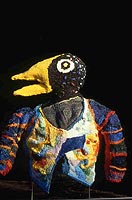
Jacket for a migrating bird
Maria-Rose Lortet
A dozen or so artists/knitters - European, American, Japanese – were represented, spanning a delicious spectrum of texture, colour, thought and story in a medium that - because it is craft as well as art, because so many of us saw it done in our own homes when we were kids - is a magical combination of simple and fantastic, process and product. We weren’t allowed to take photos, but there are some on the website, one of which I’ve stolen.
My favourite: Celia Pym’s ‘Blue Knitting’, a twenty-four-metre-long scarf knitted as she travelled around Japan, visiting every island, with yarn bought locally in each place, in shades of blue, like the wide skies and traditional indigo dyes of Japan. The exhibit was accompanied by notebooks of the journey, with journal entries, drawings and photos. “It was constantly reassuring.”, she writes, “As my companion, it allowed me to travel freely”. In an audio recording, she recalls knitting in her studio when stalled on other projects, as a way of grounding herself, getting past stress and procrastination. She came to love the feel, the process, getting lost in it, the way her brain was ‘released’ by it - loved it so much, it gradually became her art.
The journal motif recurred a lot – knitting as process, as companion, as well as product, picture, beauty. “It’s like breathing”, writes Marie-Rose Lortet of her fantastically complex, detailed work, “I’ve always felt the need to recount things. I go everywhere with my little notebooks and my pieces of material and wool… it’s the story of my life”.
Another take on this comparison comes from Stephanie Speight, who knits – garter stitch - with fine strips of recycled paper: books, maps, sheet music, cash register tape, old dress patterns. The traces of old words in every stitch.
Then there were Donna Wilson’s bright, weird knitted dolls – a surreal take on children’s knitted toys. Strange, soft knitted ‘sheep’ from Takehiko Sanada.
I don’t know when I’ve felt more engaged and delighted by anything and I wasn’t alone. Visitors were invited to record their reactions on cards and hang them on the wall. Almost everyone was doing this, writing and drawing furiously, hanging them up 8, 9, 10 cards thick, spilling off the hooks. What an accolade. What an inspiration.This feels like something that melds beautifully with journaling, blogging, recording…
All those exhibitions I didn’t see… it’s all too much. I dream of living in a perfect village where some perfect benefactor arranges, maybe 3 or 4 times a year, an exhibition of one perfect artwork (perfect to my taste, that is), which I can visit every day for three months, appreciate fully, learn by heart, make my own… a totally selfish fantasy. Sometimes I can make it real by just zoning out everything but the one piece that most touches me, as I did at the current Dulwich Picture Gallery exhibition of Modern Pots. The first item on display, perfectly placed for viewing against the backdrop of Soane’s wonderful gallery, was a small head of potter Lucie Rie by her student Hans Coper. The head of a middle-aged woman, long hair drawn back, bare-faced, ordinarily beautiful. An endlessly evocative work, which I can’t find a picture of… (so why am I mentioning it - this is bad blogging, isn’t it?). I went back and back to it, prowled round and round it, and it still lingers in my mind. I may just have to return and buy the expensive, glossy book on Hans Coper which has a photo. Or perhaps I don’t need to, because it will stay in my mind’s eye.
So, very often, I just feel sickened by the riches on display here in London, like having a ten-course meal on the table all at once, and I don’t get to even five per cent of what I might enjoy. Of all that was on offer over the Easter break, I made it, finally, to just one exhibition, and I’m so glad I did – the Knit2Together show at the Crafts Council.

Jacket for a migrating bird
Maria-Rose Lortet
A dozen or so artists/knitters - European, American, Japanese – were represented, spanning a delicious spectrum of texture, colour, thought and story in a medium that - because it is craft as well as art, because so many of us saw it done in our own homes when we were kids - is a magical combination of simple and fantastic, process and product. We weren’t allowed to take photos, but there are some on the website, one of which I’ve stolen.
My favourite: Celia Pym’s ‘Blue Knitting’, a twenty-four-metre-long scarf knitted as she travelled around Japan, visiting every island, with yarn bought locally in each place, in shades of blue, like the wide skies and traditional indigo dyes of Japan. The exhibit was accompanied by notebooks of the journey, with journal entries, drawings and photos. “It was constantly reassuring.”, she writes, “As my companion, it allowed me to travel freely”. In an audio recording, she recalls knitting in her studio when stalled on other projects, as a way of grounding herself, getting past stress and procrastination. She came to love the feel, the process, getting lost in it, the way her brain was ‘released’ by it - loved it so much, it gradually became her art.
The journal motif recurred a lot – knitting as process, as companion, as well as product, picture, beauty. “It’s like breathing”, writes Marie-Rose Lortet of her fantastically complex, detailed work, “I’ve always felt the need to recount things. I go everywhere with my little notebooks and my pieces of material and wool… it’s the story of my life”.
Another take on this comparison comes from Stephanie Speight, who knits – garter stitch - with fine strips of recycled paper: books, maps, sheet music, cash register tape, old dress patterns. The traces of old words in every stitch.
Then there were Donna Wilson’s bright, weird knitted dolls – a surreal take on children’s knitted toys. Strange, soft knitted ‘sheep’ from Takehiko Sanada.
I don’t know when I’ve felt more engaged and delighted by anything and I wasn’t alone. Visitors were invited to record their reactions on cards and hang them on the wall. Almost everyone was doing this, writing and drawing furiously, hanging them up 8, 9, 10 cards thick, spilling off the hooks. What an accolade. What an inspiration.This feels like something that melds beautifully with journaling, blogging, recording…
Tuesday, April 05, 2005
Magical music

Lucy Duran
I fell asleep with the radio on - BAD habit - and woke about 3 am to find myself bathed in magical music. It was Charlie Gillett's world music programme on the BBC World Service, this week a celebration of the work of multi-lingual academic/producer/catalyst Lucy Duran with Malian kora player Toumani Diabate and others. You can hear the programme here, but only until Wednesday 6 April, when it will be replaced by something new - and no doubt also wonderful. And listen here to the programme Lucy Duran often presents on BBC Radio 3.

Lucy Duran
I fell asleep with the radio on - BAD habit - and woke about 3 am to find myself bathed in magical music. It was Charlie Gillett's world music programme on the BBC World Service, this week a celebration of the work of multi-lingual academic/producer/catalyst Lucy Duran with Malian kora player Toumani Diabate and others. You can hear the programme here, but only until Wednesday 6 April, when it will be replaced by something new - and no doubt also wonderful. And listen here to the programme Lucy Duran often presents on BBC Radio 3.
Love to Julia
If you haven't already, go and read Julia Darling's weblog , enjoy her wonderful writing and send her some love. She puts everything else in perspective. Here are two of her poems. I have never read anything so alive about dying.
Stripes of light and dark

My office building as I arrived this morning. Thinking on this. Very little is only dark. I love how having a camera is making me notice things.

My office building as I arrived this morning. Thinking on this. Very little is only dark. I love how having a camera is making me notice things.
Monday, April 04, 2005
Breathing in

wood anemones, I think. click to enlarge
On Sunday evening I walked in the wood. Not a lot of woods in London. None, perhaps, so old and haunting as this fragment I’m lucky enough to live close to.
Between the green-grey-green, the low mossy sunshine picks out the first flowers. Spring at its gentlest, joy stroked into life.
Thinking: tomorrow morning, back to work. Breathe in pleasure, breathe in dread. A fist-fight in my chest.
So here I am back in the office, surviving – just. Breathing through panic. Breathing through overwhelmed and back into the moment - just the moment, all I have to do is take the next breath. I wondered last night if walking in the wood was the best thing to do, if I’d have done better not to open my senses and feelings, to dread as well as beauty. But then I wouldn’t have had the softness of it still wrapped around my heart this morning as I forged, one step at a time, through the bad stuff.
I’ve noticed the Spring more this year, looked harder and let myself be touched more deeply, than for many years - because of those lovely blogs by nature-lovers which have become part of my life in the past few months; because I bought a digital camera and started, for the first time ever, to take photos. It’s sweet, and different, and painful. I don’t think I’m about to withdraw from it.

wood anemones, I think. click to enlarge
On Sunday evening I walked in the wood. Not a lot of woods in London. None, perhaps, so old and haunting as this fragment I’m lucky enough to live close to.
Between the green-grey-green, the low mossy sunshine picks out the first flowers. Spring at its gentlest, joy stroked into life.
Thinking: tomorrow morning, back to work. Breathe in pleasure, breathe in dread. A fist-fight in my chest.
So here I am back in the office, surviving – just. Breathing through panic. Breathing through overwhelmed and back into the moment - just the moment, all I have to do is take the next breath. I wondered last night if walking in the wood was the best thing to do, if I’d have done better not to open my senses and feelings, to dread as well as beauty. But then I wouldn’t have had the softness of it still wrapped around my heart this morning as I forged, one step at a time, through the bad stuff.
I’ve noticed the Spring more this year, looked harder and let myself be touched more deeply, than for many years - because of those lovely blogs by nature-lovers which have become part of my life in the past few months; because I bought a digital camera and started, for the first time ever, to take photos. It’s sweet, and different, and painful. I don’t think I’m about to withdraw from it.
Friday, April 01, 2005
A week off work

poissons d'avril
I took two extra days, so I could have the whole week off. A whole week, and so damn little achieved. Whenever I stop working, stop commuting three hours every day, I just feel so tired, falling down through loosening layers of tension, wariness, irritation, into a deep pit of exhaustion; with every defence discarded, falling further. A week is not enough, even, to hit bottom. So I’m trying to forgive myself for not having done the major springcleaning I envisaged, or travelled to Chartres to walk the cathedral labyrinth, or been to see the Matisse exhibition, the Africa exhibition, the Writer in the Garden exhibition, the exhibition of paintings by Strindberg, the Turner-Whistler-Manet exhibition, the Turks exhibition or the Tree of Life at the British Museum, or even written something more substantial for my blog.

poissons d'avril
I took two extra days, so I could have the whole week off. A whole week, and so damn little achieved. Whenever I stop working, stop commuting three hours every day, I just feel so tired, falling down through loosening layers of tension, wariness, irritation, into a deep pit of exhaustion; with every defence discarded, falling further. A week is not enough, even, to hit bottom. So I’m trying to forgive myself for not having done the major springcleaning I envisaged, or travelled to Chartres to walk the cathedral labyrinth, or been to see the Matisse exhibition, the Africa exhibition, the Writer in the Garden exhibition, the exhibition of paintings by Strindberg, the Turner-Whistler-Manet exhibition, the Turks exhibition or the Tree of Life at the British Museum, or even written something more substantial for my blog.
